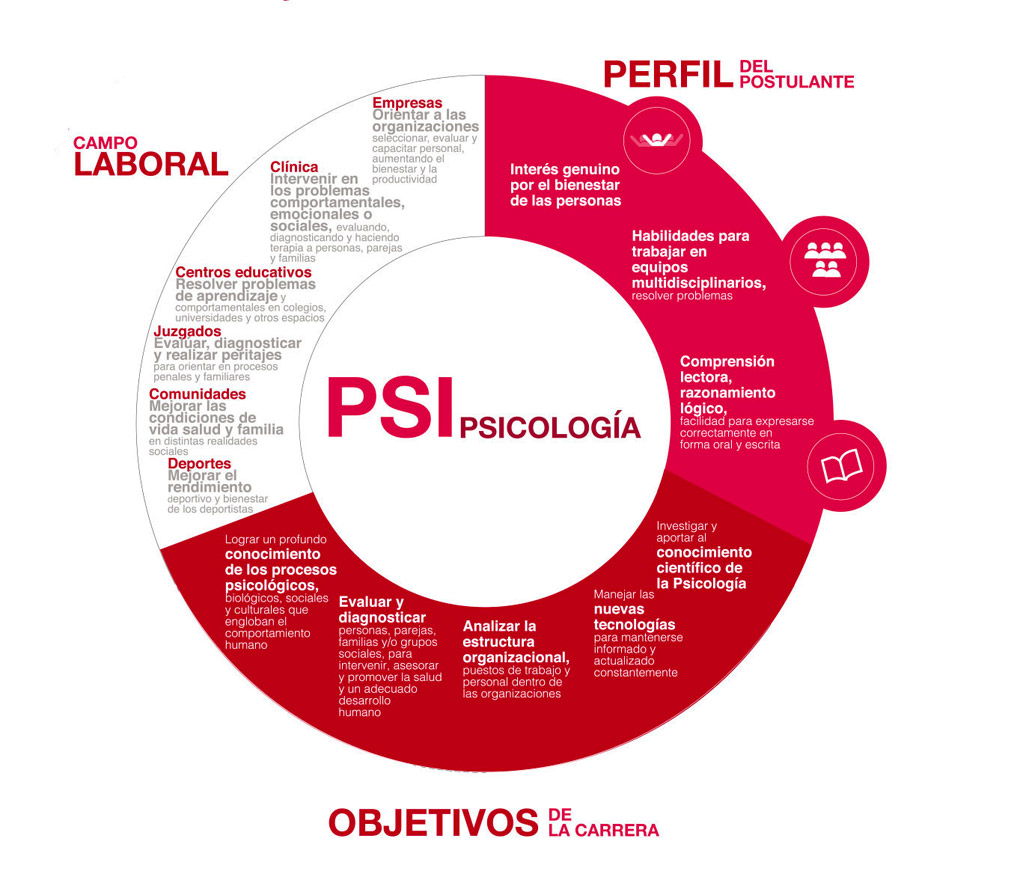
The degree in Psychology was created in 1997 in response to the labor market needs in the realms of businesses and clinical health, as well as the professional demand on the part of High School graduates in the city, especially in the areas of Work Psychology and Organizations and Clinical Psychology. From the first Study Plan, the degree was oriented towards complying with the objectives, mission and vision of the UPSA.
As a graduate in Psychology you will be prepared to work in companies, schools, private consulting, health care systems, the justice system, projects, universities, sports teams and other work spaces because Psychology allows you to adapt to the areas you most like to work in.
In Companies you will help improve the organizations and the people who work there; in the clinical area you will help people feel better and promote mental health; in schools you will support children and their families; in the judicial system you will be indispensable in penal and family processes and so on and so forth for other work environments. You will be capable of distinguishing psychological, biological, social and cultural processes that affect the behavior of people to be able to evaluate them and make appropriate decisions.

Plan
de
estudios
| PRIMER SEMESTRE | Fund. de Administración de Empresas | Historia de la Psicología | Psicología General | Ofimática Avanzada | Investigación Documental | Pensamiento Crítico |
|---|---|---|---|---|---|---|
| SEGUNDO SEMESTRE | Teoría de la Organización | Procesos Cognitivos Básicos | Personalidad | Psicobiología | Electiva I | Estadística Base |
| TERCER SEMESTRE | Organización y Sistemas | Aprendizaje | Psicología Social I | Neuropsicología | Interculturalidad, Ciudadanía y Género | Psicoestadística |
| CUARTO SEMESTRE | Derecho Social | Psicología Educativa | Psicología Social II | Psicología del Desarrollo I | Inglés | Met. de la Investigación Cuantitativa |
| QUINTO SEMESTRE | Comunicación Corporativa | Destrezas Básicas de la Entrevista | Sexología | Psicología del Desarrollo II | Met. de la Investigación Cualitativa | Teoría de los Test |
| SEXTO SEMESTRE | Administración de RRHH | Psicodiagnóstico | Psicopatología I | Psicología Comunitaria | Dinámica Grupal | Psicología Experimental |
| SÉPTIMO SEMESTRE | Evaluación de RRHH | Psicometría | Psicopatología II | Teoría y Clínica Psicoanalítica | Psicología Jurídica | Electiva II (en Inglés) |
| OCTAVO SEMESTRE | Resolución de Conflictos y Negociación | Terapia Cognitivo Conductual | Terapias Humanistas | Técnicas Proyectivas | Orientación e Intervención Sistémica | |
| NOVENO SEMESTRE | Desarrollo Organizacional | Modalidad de Graduación I | Pasantía Profesional (320 hrs) | Pasantía Clínica (120 hrs) |
||
| DÉCIMO SEMESTRE | Gestión por Competencias | Modalidad de Graduación II |
Materias
Electivas
-
Creatividad
-
Ética y Responsabilidad Social
-
Paradigmas y Discursos Globales
-
Introducción a la Economía
-
Fundamentos de Marketing
-
Seminario Filosófico
-
Realidad Nacional
-
Redacción y Estilo
-
Writing Lab
-
Life Plan To Excellence
Espacios y Actividades de la Carrera
-
CIAP: Espacio dedicado a la formación clínica y al fortalecimiento de la Investigación
-
Laboratorio de Neurocognición: Primero en el país Brinda atención de Evaluación y rehabilitación neurocognitiva de personas con alteraciones en este campo.
-
La Revista de Estudiantes de Psicología: Publica ensayos, investigaciones y experiencias de campo de los estudiantes de la carrera de Psicología.










